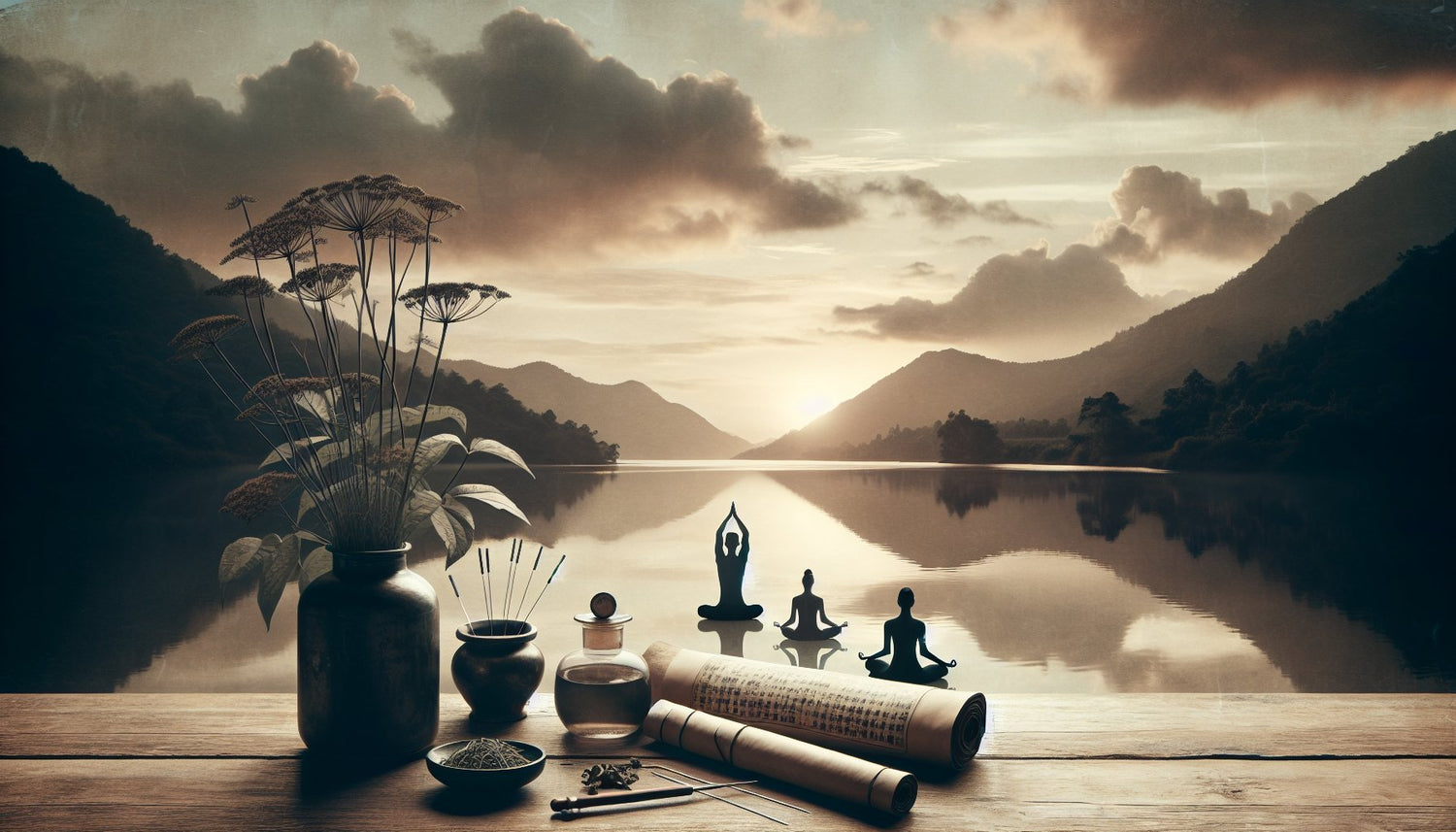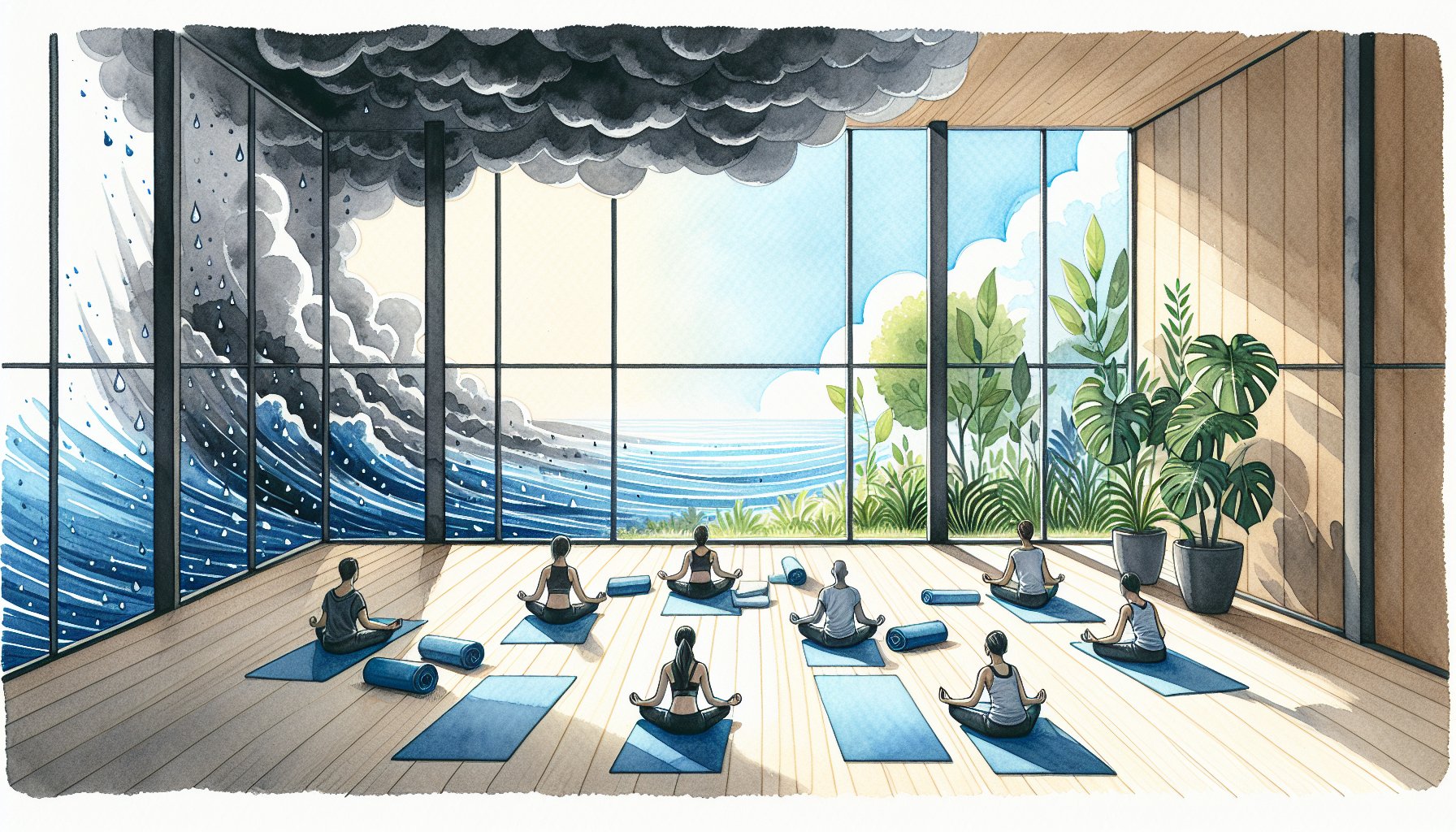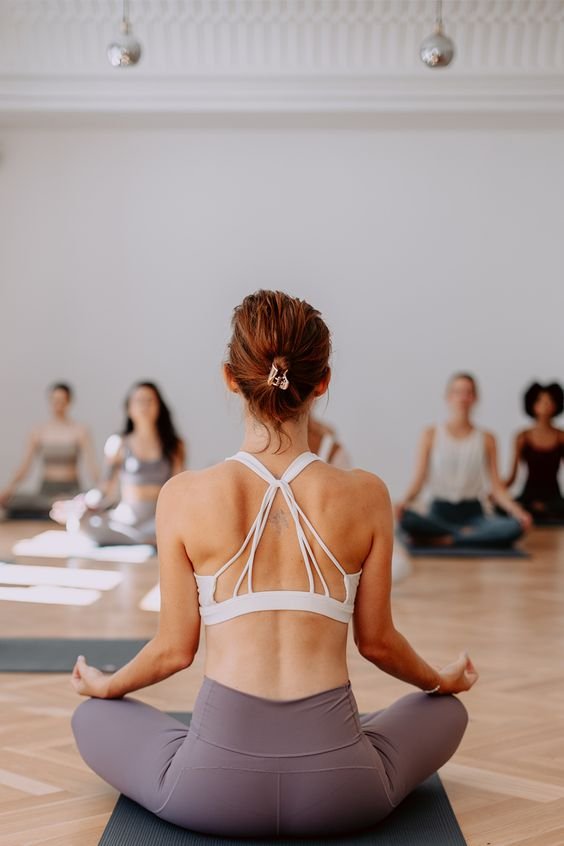In Traditional Chinese Medicine (TCM), the water element plays a crucial role, particularly associated with the season of winter and the deep-seated emotion of fear. This profound connection underlines the significance of understanding how the water elements influence both physical and emotional well-being. As the practice of yoga, especially yin yoga, incorporates the principles of TCM, integrating the water element into the routine can enhance the therapeutic effects of the poses on cork yoga mats.
Yin yoga, with its slow-paced style, is designed to work in harmony with the water element, promoting a sense of calm and fluidity in practice. By focusing on kidneys and the urinary bladder, the organs corresponding to the water element, yin yoga supports the body's natural balance and healing. This article delves into the essence of the water element in TCM and yin yoga, offering insights into nurturing this element through practice on a cork yoga mat and managing the emotions it governs.
The Essence of the Water Element in TCM
In Traditional Chinese Medicine (TCM), the water element is deeply intertwined with the body's physiological and energetic systems, influencing various aspects of health and well-being:
- Organ Representation and Vital Essence:
-
- The kidneys, representing the Yin organ, are considered the source of vitality and longevity, housing the Jing or vital essence, crucial for life's processes such as growth and aging.
- The urinary bladder, the corresponding Yang organ, acts as a fluid reservoir supporting the kidneys.
- Meridian Channels:
- The Kidney Meridian Channel and the Urinary Bladder Meridian Channel are primary pathways in the meridian system, facilitating the flow of Qi and bodily fluids.
- Additionally, the Kidney Sinew Channel and Urinary Bladder Sinew Channel, more superficial channels, play roles in connecting and supporting organ functions.
- Energetic and Emotional Attributes:
- Water element characteristics include being yin (slow, dark, cool) and governing aspects like fear and willpower through the spirit known as Zhi.
- It symbolizes adaptability, renewal, and wisdom, essential for managing life's challenges and changes.
- The element's influence extends to personality traits and interpersonal relationships, emphasizing the importance of balance and self-awareness.
- These attributes underscore the water element's foundational role in TCM, highlighting its impact on both physical health and emotional resilience.
Yin Yoga and the Water Element
Yin Yoga, deeply intertwined with Traditional Chinese Medicine (TCM), harnesses the water element to foster physical and emotional equilibrium. The practice is particularly effective in winter, aligning with the season's yin characteristics of stillness and introspection.
- Meridian Stimulation through Poses:
- Sphinx/Seal Pose: Extends the spine and compresses the kidneys, directly stimulating the kidney meridian, enhancing renal function and energy flow.
- Caterpillar Pose: Encourages introspection and relaxation, connecting with the water element's yin energy, beneficial for deep emotional processing.
- Frog Pose: A profound groin and adductor stretch, opening the kidney and bladder meridians, promoting the release of fear and fostering courage.
- Breathing Practices and Emotional Regulation:
- Dangling Breathing: Focuses on the kidneys, lengthening the backline and drawing awareness to the water element, which aids in emotional regulation and fear management.
- Wide Knee Child’s Pose with Needle Arms: Builds awareness in the kidneys and spine, crucial for nurturing the water element's calming energy.
- Supporting Kidney Health:
- Massaging Kidney Point One: Located between the second and third toes, massaging this point can nourish the kidneys, providing grounding and stability.
- One-hour Yin Yoga Sequence: Targets the kidney chi pathway, crucial for the health of the low back, adrenals, bones, and joints, thereby enhancing overall vitality.
These practices not only address physical ailments associated with the water element but also help in managing psychological patterns like fear and anxiety, making Yin Yoga an essential practice for those looking to harmonize their body and mind.
Kidneys and Urinary Bladder: The Organs of the Water Element
In Traditional Chinese Medicine (TCM), the kidneys and urinary bladder are pivotal organs within the water element, each playing unique roles in maintaining health and emotional balance:
- Kidney Functions:
- Filtration and Essence Storage: The kidneys not only filtrate blood to remove impurities, but they also store the 'essence' which governs growth, development, and maturation. This essence, or Jing, is critical for vitality and longevity.
- Regulation of Body Systems: They are involved in water metabolism, fluid balance, temperature regulation, and also play a significant role in heat regulation, reproduction, sexuality, and blood supplementation.
-
- Emotional and Energetic Influence: Housing the spirit Zhi, the kidneys influence willpower and manage the emotion of fear, making them central to emotional resilience.
- Urinary Bladder Functions:
- Waste Elimination: This organ is responsible for storing and excreting urine, directly influencing the body’s water metabolism.
- Supporting Kidney Functions: It acts as a fluid reservoir supporting the kidneys and monitors resource use, which is crucial for overall energy management.
- Meridian Influence: The Urinary Bladder meridian runs along the back of the body and can be energized through specific poses in yoga, aiding in tension release and emotional processing.
- Health and Imbalance:
- Symptoms of Imbalance: Issues like low back pain, weak knees, frequent urination, and excessive fear point to kidney imbalances, while symptoms such as back pain, bladder pain, and emotional disturbances like jealousy may indicate bladder issues.
- Management through TCM: Utilizing elements like Goji berry and Anemarrhena, TCM practices focus on toning the kidneys and managing menopausal symptoms, respectively, highlighting the interconnectedness of these organs with overall well-being.
Understanding these roles and functions underscores the importance of the water element in maintaining balance and health, both physically and emotionally.
Nurturing the Water Element Through Practice
Nurturing the water element through consistent practice involves various traditional Chinese medicine techniques and lifestyle adjustments. Key practices include:
- Traditional Chinese Medicine Techniques:
- Acupuncture and Acupressure: These methods help regulate 'Ming Men Huo', the life flame, enhancing kidney function and overall vitality.
- Tuina Massage and Qi Gong: These physical practices support energy flow and balance the water element, promoting emotional resilience and physical health.
- Seasonal Alignment: During winter, a time of yin with attributes like cold and stillness, it's beneficial to slow down and reflect, aligning activities with the season's energy to conserve and replenish energy.
- Nutritional Support: Incorporating dark, salty, and hydrating foods such as black beans, root vegetables, and seaweed can support the water element. These foods are particularly important in winter to balance the inward and restful nature of the season.
- Mindfulness and Physical Activities:
- Meditation and Mindfulness: Engaging in practices that foster inner peace and clarity helps in setting intentions and understanding life's purpose, crucial during the introspective winter months.
- Yoga: Specific yoga practices on cork yoga mats can enhance the connection to the water element, supporting kidney health and emotional balance.
These practices collectively enhance the nurturing of the water element, crucial for maintaining balance and health during the yin season of winter.
Managing Fear and Cultivating Wisdom
Managing Fear and Cultivating Wisdom
- Understanding and Managing Fear:
- Fear, inherently linked to the water element, plays a crucial role in teaching caution and preparing us for challenges. However, when unbalanced, it can escalate to anxiety, hindering movement and personal growth.
- Common symptoms indicating a kidney weakness (associated with fear) include feeling cold, experiencing lower back, knee, or joint pain, and emotional symptoms such as anxiety or panic, particularly during colder months.
- Cultivating Wisdom and Resilience:
- Yin Yoga encourages the visualization of a coin, representing fear on one side and wisdom on the other. Daily practice involves metaphorically flipping this coin to face wisdom, fostering a mindset oriented towards growth and understanding.
- Cultivating the spirit of water involves learning to let go of struggle and yielding to life's natural flow, enhancing personal resilience and the ability to manage life's challenges.
- Practical Tips for Enhancing Kidney Health and Emotional Balance:
- Lifestyle Adjustments: Prioritize going to bed early, ensure proper ventilation in the sleeping area, limit screen time before bed, and engage in calming activities like reading or meditation.
- Dietary Recommendations: Incorporate dark-colored foods, ginger, turmeric, and warm beverages. Avoid or limit cold drinks, excessive caffeine, and processed foods to support kidney health and overall vitality.
- Healing Practices: Engage in solitude, meditation, and foster intimate relationships to balance the water element, promoting mental health and emotional stability.
Conclusion
As we've explored the intricate relationship between Traditional Chinese Medicine, the water element, and yin yoga, it becomes clear how these ancient practices can profoundly influence our physical and emotional well-being. By understanding the significance of the water element—associated with kidneys and urinary bladder in TCM, and recognizing its impact on managing emotions like fear, we pave the way for a more balanced and harmonious life. Embracing the slow-paced, introspective practice of yin yoga on a premium cork yoga mat not only supports our body's natural healing processes but also aids in cultivating resilience and wisdom amidst life's ebb and flow.
Incorporating the recommendations for nurturing the water element through Traditional Chinese Medicine techniques, dietary adjustments, mindfulness practices, and especially yin yoga, offers a comprehensive approach to health that aligns with the rhythms of nature and our inner selves. As we move forward, let us carry the insights gained from this exploration into our daily routines, transforming understanding into action. For those looking to deepen their practice and connect more profoundly with the water element, get a premium cork yoga mat for 15% off with promo code "BestCorkYogaMat", enhancing your journey towards equilibrium and peace.
FAQs
1. What does the water element represent in Traditional Chinese Medicine (TCM)?
In Traditional Chinese Medicine, the water element is a core component that symbolizes adaptability, renewal, and profound wisdom. It plays a crucial role in fostering physical health, emotional resilience, and spiritual development.
2. What emotions are linked to the water element?
The water element is associated with strong, deep emotions such as depth, mystery, and longing. It reflects the fluid-like nature and cohesiveness of the body, influencing both emotion and passion.
3. Is the water element considered yin or yang?
The water element is predominantly yin, representing the most feminine among the five elements in Taoist cosmology. Despite its femininity, water is regarded as a powerful element capable of navigating around obstacles without losing its essential qualities.
4. What are the personality traits of someone associated with the water element in TCM?
Individuals influenced by the water element in TCM are typically articulate, clever, and introspective. They possess a penetrating and critical approach to seeking knowledge and understanding. Water types prefer to remain hidden and enigmatic, often self-contained and self-sufficient. The primary emotion related to the water element is fear.
References
[1] - https://www.ekhartyoga.com/articles/wellbeing/the-five-elements-in-tcm-and-yin-yoga-water
[2] - https://www.liinayoga.com/blog/yin-yoga-and-water-element
[3] - https://www.ekhartyoga.com/articles/practice/the-five-elements-in-tcm-and-yin-yoga-fire
[4] - https://www.mightyriverwellness.com/blog-entries/water-chinese-medicine-kidneys-bladder
[5] - https://www.oceanflowtherapies.com/movement/water-element-yin-yoga-sequence/
[6] - https://www.ommagazine.com/yin-yoga-for-the-water-element/
[7] - https://www.youtube.com/watch?v=_3LskrhGTfo
[8] - https://insighttimer.com/blog/water-element-tcm/
[9] - https://www.phyto5.us/blog-1/the-water-type-personality-according-to-traditional-chinese-medicine-understanding-your-archetype-for-harmony-and-balance
[10] - https://balancecharleston.com/blog/2019/12/13/winter-and-the-water-element-a-chinese-medical-perspective-to-seasonal-wellbeing
[11] - https://www.thomsontcm.sg/articles/the-water-element-in-tcm/
[12] - https://www.cabaritabeachyoga.com/single-post/listen-to-your-inner-wisdom-of-the-water-element-of-tradtitional-chinese-medicine-yin-yoga
[13] - https://warriorspirithealingarts.ca/the-water-element-an-overview/
[14] - https://www.fusionhealth.com.au/blogs/fusionhealth-healthhub-blog-wood-fire-earth-metal-or-water-which-element-are-you-and-how-can-it-help-your.html?lang=en_AU
[15] - https://www.yogajournal.com/practice/yoga-sequences-type/yin-yoga-sequences/yin-yoga-for-fear/
[16] - https://www.youtube.com/watch?v=ImoIP_Z1GOM
[17] - https://annieauyoga.com/the-4fs-how-yin-yoga-can-help-regulate-trauma-responses/
[18] - https://annieauyoga.com/how-people-pleasing-can-stem-from-trauma-and-how-yin-yoga-can-help/
[19] - https://yogainternational.com/article/view/yin-yoga-sequence/
[20] - https://www.linkedin.com/pulse/understanding-role-kidneys-traditional-chinese-tcm-klara-kotyzova-iztve
[21] - https://www.youtube.com/watch?v=PUMrFdTYzfU
[22] - https://yinyoga.com/the-5-elements-part-two-water/
[23] - https://www.canvasmat.com.au/blogs/all-yoga-things/the-water-element-in-yin-yoga
[24] - https://honeyopathy.co/blogs/journal-entries/the-water-element-personality-a-chinese-medical-perspective





Leave a comment
This site is protected by hCaptcha and the hCaptcha Privacy Policy and Terms of Service apply.